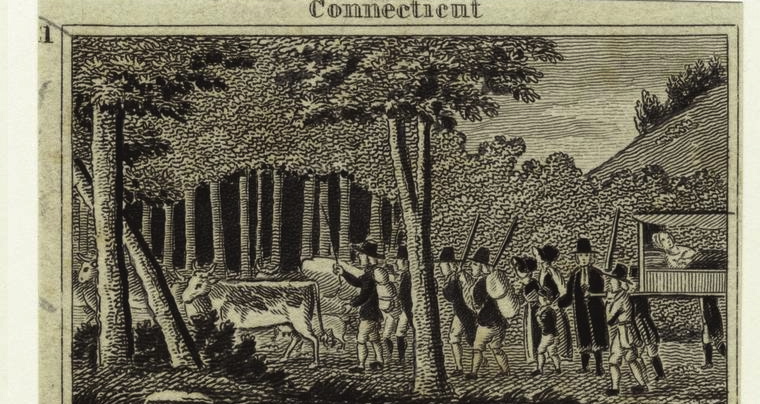The colonial Puritan Thomas Hooker died on this day (July 7) in 1647, in the Connecticut that he was instrumental in founding. History books have always had a hard time placing Hooker in the flow of American history. They would like to portray him as a champion of democracy, tolerance, and pluralism who found the Massachussetts colony too restrictive and theocratic, but it’s hard to make that stick since Hooker was just as convinced that God’s law is the foundation of civil society as were any of the leaders of Massachussetts. They would like to portray him as a dour, hellfire-preaching puritan, but his tenderness and pastoral sensitivity make that portrait unlikely.
However Hooker may fit, or refuse to fit, into the American colonial narrative, he left a legacy of powerful sermons and spiritual writings. His most influential work was one of his earliest writings, the 1629 book entitled The Poor Doubting Christian Drawn to Christ. Hooker wrote this book while still living in England, before his three-year exile in the Netherlands and subsequent emigration to America.
Poor Doubting Christian has one of those long sub-titles that are practically prefaces to the book: The Poor Doubting Christian Drawn to Christ: Wherein the main Hindrances, which keep men from coming to Christ, are discovered. With speciall helps to recover God’s favour.
Poor Doubting Christian is a long encouragement for believers to have confident assurance of salvation. Hooker chases the doubting heart down all of its attempted escapes routes, and warns against the two main errors that beset the believer: Presumption and despair. These are the two classic sins against the virtue of hope. Both vices direct our attention to ourselves, with opposite evaluations but identical results. Presumption directs our attention to ourselves and judges our lives good enough for God; it takes salvation for granted, and is thus unable to look to God for mercy. But despair directs our attention to our sins:
And thus the soul is always poring and always too much fastened and settled upon his corruptions ever stirring the sore without ever going to the physician Where note that a man is as well kept from looking to Christ by despair as by presumption.
Hooker is remarkable for his ability to diagnose a spiritual problem and then follow the case through all the twists and turns, all the over-spiritualizing and covert operations that his readers can devise. For example, he knows that as soon as he demonstrates our need to get outside of ourselves, we will convert the principle of “getting outside myself” into a project we can undertake for our self-improvement. So he follows relentlessly through the next turn of the dialectic of self-deception:
Objection: “But oh!” saith a poor sinner, “fain would I go out of myself. I see too well now that I have rested, and do rest upon duties done, but I cannot deny myself as I would.”
I answer, it is Satan’s subtilty to keep us in ourselves by endeavouring thus to make us go out of ourselves. For by our own strength he would have us to do it; and persuades us we may. But this is a marvellous deepness of his, wherein he shews both malice and cunning in the superlative. For here he makes us believe (and we out of ignorance are pursuaded as he would have us,) that we have the staff in our own hands; that is, the power to get out of ourselves. But is it so? Oh no! it is a supernatural work to be quite out of ourselves. The same hand must bring us out of ourselves that must bring us to Christ.
To communicate his message, Thomas Hooker developed a striking literary style. One twentieth-century critic praised it in these terms:
The modern reader of The Poor Doubting Christian is immediately impressed by Hooker’s virtuosity in the shaping of sentences, by the extraordinary variety and vigor of sentence structure. The positive rhythmical patterns, the clear syntax even in long sentences, the sure achievement of desired effects of suspense and emphasis through sentence patterns –all confirm Moses Coit Tyler’s dictum: ‘What he wrote is literature meant for the ear, not the eye; having the rhythm and cadence of a good speech. It is constructed for swift practical effect on the minds, passions, resolutions of men.’
